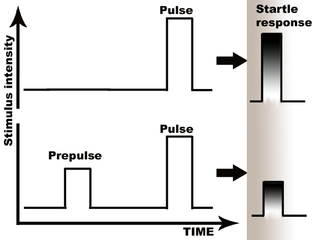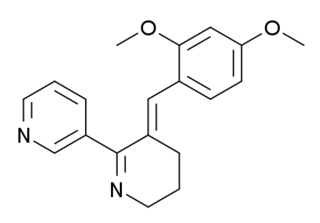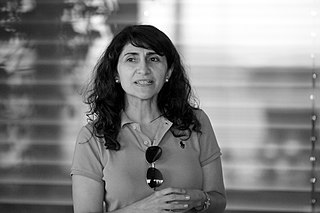
Veena Kumari is Professor of Psychology at Brunel University London. [1] [2]

Veena Kumari is Professor of Psychology at Brunel University London. [1] [2]
Kumari completed a PhD in psychology in 1993, from Banaras Hindu University in India. She came to England as a postdoctoral researcher at the Institute of Psychiatry of King's College London, now the Institute of Psychiatry, Psychology and Neuroscience, and remained there, becoming a Full Professor in 2006. From 2016 to 2018 she worked in the US as Chief Scientific Officer for Southern California mental health provider Sovereign Health. [3] In 2018, Kumari returned to England, taking up her present position as a Professor of Experimental Psychology and the Director of the Centre for Cognitive Neuroscience (CCN) at Brunel University London. [3] [4]
Before becoming a full Professor in 2006, she was a Beit Memorial Research Fellow in 1999, and a Wellcome Senior Fellow in Basic Biomedical Science in 2002. Her research has won many international awards, including the Young Investigator Award given by the National Alliance of Research on Schizophrenia and Depression in USA in 1999, the British Association of Psychopharmacology's Clinical Psychopharmacology Prize in 2002, [1] and the prestigious Humboldt Research Award in 2014, [4] as well as many fellowships. [1] [4]
Schizotypal personality disorder, also known as schizotypal disorder, is a cluster A personality disorder. The Diagnostic and Statistical Manual of Mental Disorders (DSM) classification describes the disorder specifically as a personality disorder characterized by thought disorder, paranoia, a characteristic form of social anxiety, derealization, transient psychosis, and unconventional beliefs. People with this disorder feel pronounced discomfort in forming and maintaining social connections with other people, primarily due to the belief that other people harbor negative thoughts and views about them. Peculiar speech mannerisms and socially unexpected modes of dress are also characteristic. Schizotypal people may react oddly in conversations, not respond, or talk to themselves. They frequently interpret situations as being strange or having unusual meanings for them; paranormal and superstitious beliefs are common. Schizotypal people usually disagree with the suggestion that their thoughts and behaviors are a 'disorder' and seek medical attention for depression or anxiety instead. Schizotypal personality disorder occurs in approximately 3% of the general population and is more commonly diagnosed in males.

Prepulse inhibition (PPI) is a neurological phenomenon in which a weaker prestimulus (prepulse) inhibits the reaction of an organism to a subsequent strong reflex-eliciting stimulus (pulse), often using the startle reflex. The stimuli are usually acoustic, but tactile stimuli and light stimuli are also used. When prepulse inhibition is high, the corresponding one-time startle response is reduced.
Nancy Coover Andreasen is an American neuroscientist and neuropsychiatrist. She currently holds the Andrew H. Woods Chair of Psychiatry at the Roy J. and Lucille A. Carver College of Medicine at the University of Iowa.

Patricia Goldman-Rakic was an American professor of neuroscience, neurology, psychiatry and psychology at Yale University School of Medicine. She pioneered multidisciplinary research of the prefrontal cortex and working memory.

GTS-21 is a drug that has been shown to enhance memory and cognitive function. It has been studied for its potential therapeutic uses, particularly in the treatment of neurodegenerative diseases and psychiatric disorders.
Trevor William RobbinsCBE FRS FMedSci is a professor of cognitive neuroscience and the former Head of the Department of Psychology at the University of Cambridge. Robbins interests are in the fields of cognitive neuroscience, behavioural neuroscience and psychopharmacology.

Marc Jeannerod was a neurologist, a neurophysiologist and an internationally recognized expert in cognitive neuroscience and experimental psychology. His research focuses on the cognitive and neurophysiological mechanisms underpinning motor control, motor cognition, the sense of agency, and more recently language and social cognition. Jeannerod's work bridges with elegance and rigor various levels of analysis, ranging from neuroscience to philosophy of mind, with clear implications for the understanding of a number of psychiatric and neurological disorders, especially schizophrenia.

Vittorio Gallese is professor of Psychobiology at the University of Parma, Italy, and was professor in Experimental Aesthetics at the University of London, UK (2016–2018). He is an expert in neurophysiology, cognitive neuroscience, social neuroscience, and philosophy of mind. Gallese is one of the discoverers of mirror neurons. His research attempts to elucidate the functional organization of brain mechanisms underlying social cognition, including action understanding, empathy, language, mindreading and aesthetic experience.

PHA-543,613 is a drug that acts as a potent and selective agonist for the α7 subtype of neural nicotinic acetylcholine receptors, with a high level of brain penetration and good oral bioavailability. It is under development as a possible treatment for cognitive deficits in schizophrenia. It reduces excitotoxicity and protects striatal dopaminergic neurons in rat models. It also potentiates cognitive enhancement from memantine, decreases dynorphin release and inhibits GSK-B3.
Sophia Frangou is a professor of psychiatry at the Icahn School of Medicine at Mount Sinai where she heads the Psychosis Research Program. She is a Fellow of the Royal College of Psychiatrists and vice-chair of the RCPsych Panamerican Division. She is a Fellow of the European Psychiatric Association (EPA) and of the American Psychiatric Association (APA). She served as vice-president for Research of the International Society for Bipolar Disorders from 2010 to 2014. She has also served on the Council of the British Association for Psychopharmacology. She is founding member of the EPA NeuroImaging section and founding chair of the Brain Imaging Network of the European College of Neuropsychopharmacology. She is one of the two Editors of European Psychiatry, the official Journal of the European Psychiatric Association.

Angela Friederici is a director at the Max Planck Institute for Human Cognitive and Brain Sciences in Leipzig, Germany, and is an internationally recognized expert in neuropsychology and linguistics. She is the author of over 400 academic articles and book chapters, and has edited 15 books on linguistics, neuroscience, language and psychology.
Barbara Jacquelyn Sahakian, is professor of clinical neuropsychology at the department of psychiatry and Medical Research Council (MRC)/Wellcome Trust Behavioural and Clinical Neuroscience Institute, University of Cambridge. She is also an honorary clinical psychologist at Addenbrooke's Hospital, Cambridge. She has an international reputation in the fields of cognitive psychopharmacology, neuroethics, neuropsychology, neuropsychiatry and neuroimaging.
Mark J. Millan is a neuroscientist specialising in the study and improved treatment of disorders of brain. He was the Director of Pharmacological Innovation for the Central Nervous System (CNS) at the Institute de Recherché de Servier (IDRS) in Paris, France. He is also the Secretary of the European College of Neuropsychopharmacology. Currently he is a Visiting Professor in the School of Psychology and Neuroscience at Glasgow University. Born in Edinburgh, Scotland, he is the son of former Scottish Labour Party Leader and European Commissioner, Bruce Millan, studied at Cambridge University and then spent ten years at the Max Planck Institut fur Psychiatrie, Munich, before moving to Paris.

Ganesan Venkatasubramanian is an Indian psychiatrist and clinician-scientist who works as a professor of psychiatry at the National Institute of Mental Health and Neurosciences, Bangalore (NIMHANS). His overarching research interest to learn the science that will facilitate a personalized approach to understand and treat severe mental disorders like schizophrenia. Venkatasubramanian is known for his studies in the fields of schizophrenia, transcranial Direct Current Stimulation (tDCS), brain imaging, neuroimmunology, neurometabolism and several other areas of biological psychiatry. The Council of Scientific and Industrial Research, the apex agency of the Government of India for scientific research, awarded him the Shanti Swarup Bhatnagar Prize for Science and Technology, one of the highest Indian science awards, for his contributions to medical sciences in 2018. He was also one of the collaborating scientists in the NIMHANS-IOB Bioinformatics and Proteomics laboratory of the Institute of Bioinformatics (IOB) in Bangalore and NIMHANS. Besides, he is an adjunct faculty at the Centre for Brain Research (CBR) in Bangalore.
Heather Clare Whalley is a Scottish scientist. She is a senior research fellow in neuroimaging at the Centre for Clinical Brain Sciences, University of Edinburgh, and is an affiliate member of the Centre for Genomic and Experimental Medicine at the University of Edinburgh. Her main focus of research is on the mechanisms underlying the development of major psychiatric disorders using the latest genomic and neuroimaging approaches.
Deanna Marie Barch is an American psychologist. She is a chair and professor of Psychological and Brain Sciences and the Gregory B. Couch Professor of Psychiatry at Washington University in St. Louis. Her research includes disorders such as schizophrenia, depression, cognitive and language deficits. She also focuses on behavioral, pharmacological, and neuroimaging studies with normal and clinical populations. Barch is a deputy editor at Biological Psychiatry. She previously served as editor-in-chief of Cognitive, Affective and Behavioral Neuroscience.

Bita Moghaddam is an Iranian-American neuroscientist and author. She is currently the Ruth Matarazzo Professor of Behavioral Neuroscience at Oregon Health & Science University. Moghaddam investigates the neuronal processes underlying emotion and cognition as a first step to designing strategies to treat and prevent brain illnesses.

Paolo Fusar-Poli is an Italian and British medical doctor, psychiatrist, and Professor at the Institute of Psychiatry, Psychology and Neuroscience, King's College, London and at the Department of Brain and Behavioral Sciences, University of Pavia.

BJ Casey is an American cognitive neuroscientist and expert on adolescent brain development and self control. She is the Christina L. Williams Professor of Neuroscience at Barnard College of Columbia University where she directs the Fundamentals of the Adolescent Brain (FAB) Lab and is an Affiliated Professor of the Justice Collaboratory at Yale Law School, Yale University.

Gemma Modinos, born 1980 in Castellar del Vallès, is a Spanish neuropsychologist. She works as a Reader of Neuroscience and Mental Health at the Institute of Psychiatry, Psychology and Neuroscience of King's College London. She was a Wellcome Trust & The Royal Society Sir Henry Dale Fellow (2017-2023) and is a Group leader at the MRC Centre for Neurodevelopmental Disorders at King's College London. She was 2020-2022 Chair of the Young Academy of Europe, where she directed European efforts to optimise science policy from a youthful perspective; and 2020-2022 Junior Member of the Executive Board of the Schizophrenia International Research Society. She is known for her work revealing the role of emotion-related brain mechanisms and the neurotransmitters GABA and glutamate in the development of psychosis, and investigating how targeting these mechanisms can help design new therapeutic strategies.